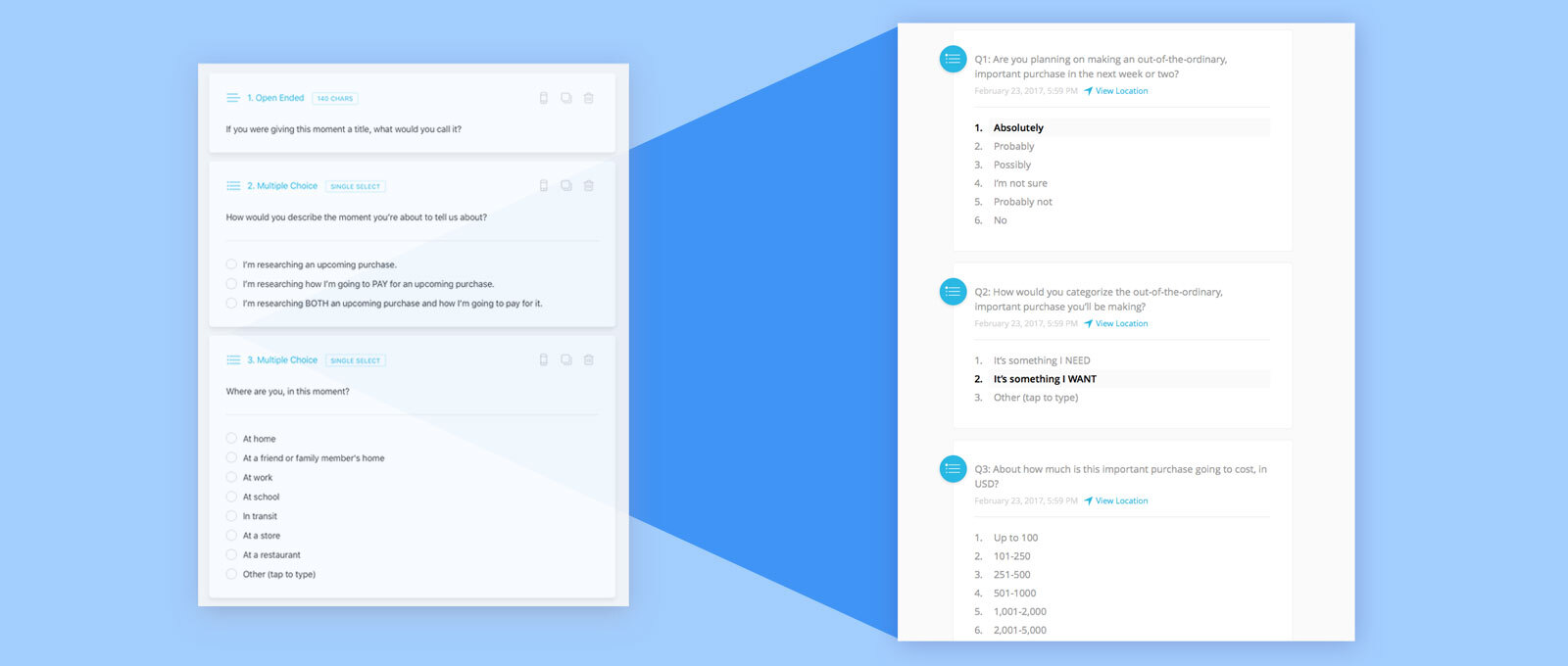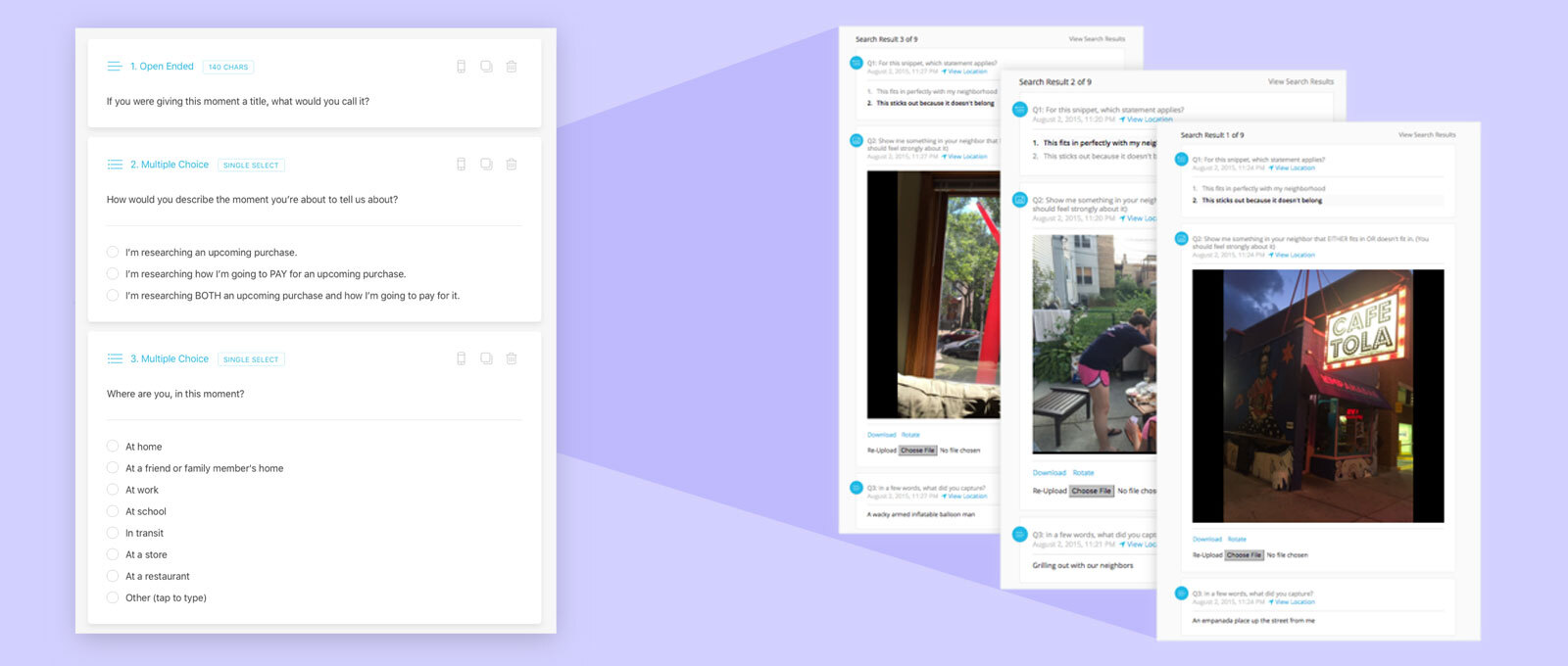More than Remote Interviews: Three Strategies for Mobile Qual Study Design
Inflexible surveys and expensive focus groups don’t have to hold your insights hostage.
Thanks to the ever growing number of people who carry a smartphone around all day every day, researchers can use mobile research tools to design projects that capture participants’ experiences as they actually happen.
So instead of asking study subjects to remember past choices they’ve made on a sterile survey form or in an artificial focus group setting, you can ask participants to answer questions and take videos that show you what they’re doing—and why—in the moment.

That’s the beauty of mobile research: maximum authenticity with minimal intrusion.
There are a few tricks to doing this well. Mobile research is remote research, which means there's more room for participants—we call them “scouts” at dscout—to misinterpret components of your study or skip over important directions.
By following three key strategies, you can keep your participants engaged, on track and confident while still giving them the freedom necessary to capture their own unique experiences—which will give you an amazingly rich data set to tackle with your meaning-making skills.
Tell participants when and how to talk to you
The simplest type of mobile study captures the same kind of data a survey would—the difference being, scouts can answer questions from the privacy and comfort of home.
To ensure participants are in the right mindset for this kind of research activity (a “mission” in dscout lingo), ask scouts beforehand to carve out 10-15 minutes to sit someplace quiet and well-lit so they can thoughtfully answer your questions. This helps ensure respondents do your mission justice and give you clear, usable video.

But you can get so much more from mobile research than remote interviews. To unlock mobile qual’s true potential, you’ll need to embrace a little chaos and ask scouts to provide a series of memorable experiences or opinions over time in their day to day life.
Doing this well is a balancing act. You’ll need to give your respondents the freedom to choose the kind of experiences they share with you. But you’ll still want to provide clear examples of triggers that could prompt them to open dscout on their phone and start recording.

Here’s an abbreviated example of a typical two-mission dscout project. The first mission works like a remote interview, and the second asks scouts to capture a series of noteworthy moments. (You can find additional examples here.)
Mission 1 (Interview-style):
Your Music Preferences
Instructions: Tell us a bit about your music preferences
Minimum Entries: 1
Days to complete: 2
1. What kind of music do you typically listen to? (open-ended)
2. In a 30-second selfie video, tell us how you typically discover new music. (video capture)
3. How do you most frequently discover new music? (multi-select list)
__ conversations with friends
__ Soundcloud
__ Spotify
__ Pandora
__ iTunes
__ Pitchfork
__ YouTube
__ going to concerts
__ Other (tap to type)
Mission 2 (Moments-style):
Discovering New Music
Instructions: Each time you discover new music this week, show us how you found it!
Minimum Entries: 5
Days to complete: 7
1. What song & band did you just discover? (open-ended)
2. Show us how you discovered this song and/or band using a photo or video. (video capture)
3. Which of the following activities or services were involved in this discovery? (multi-select)
__ conversations with friends
__ Soundcloud
__ Spotify
__ Pandora
__ iTunes
__ Pitchfork
__ YouTube
__ going to concerts
__ Other (tap to type)
A moments approach allows you to collect data on how your participants think in general, and how they behave (or what they experience) in specific situations too. It yields responses you’re unlikely to capture in an interview style mission or a focus group, and it provides emotionally rich material you can use to uncover the nuances that inform scout behavior and decision making.
Design for people who live in the real world
Whether you identify potential participants through your own channels, or serve a screener to dscout’s 100k+ panel of users, it’s important to remember your study subjects are living, breathing people working to fit your project into their frequently hectic lives.
The key is to put yourself in your respondents’ shoes. If you’d find participating in your own project exhausting or confusing, chances are many of your actual respondents will too.
Strive for balance. When designing a mobile mission, use closed-ended questions to make life easier for you and your scouts. Save open-ended questions for issues you want to really dig into. Use video or photo prompts to see the world through your participants’ eyes, but don’t ask them to create so many entries they run out of gas.
Get real with respondents
“Remote” research doesn’t have to be impersonal. Research participants respond more promptly—and more truthfully—when they know a real person is reviewing their entries. So don’t shy away from sending constructive criticism and positive reinforcement to your scouts as often as necessary using dscout’s scout management page. And let your own personality and sense of humor shine through! Real engagement from you will elicit real moments from them.
Be real about expectations and timelines too, and insist due dates are met. You can give extensions to scouts who do good work for you and happen to fall behind for one reason or another, but it will be easier to manage the whole project if expectations are clear. (For additional tips on how to do this, take a look at this quick read on scout management best practices.)

Participants who don’t understand what you need from them can get anxious and off track in a hurry. But with a little planning, clear communication and encouragement, you’ll give scouts the confidence they need to meet your expectations.
And by setting up remote participants for success, you’ll often discover wow-worthy insights that would be impossible to achieve without the speed, reach and authenticity provided by mobile qualitative techniques.
Watch Charles build a mobile qual study in dscout in this free web clinic »
Charles has helped hundreds of dscout customers run emotionally resonant research that informs critical strategic decisions.

Subscribe To People Nerds
A weekly roundup of interviews, pro tips and original research designed for people who are interested in people




